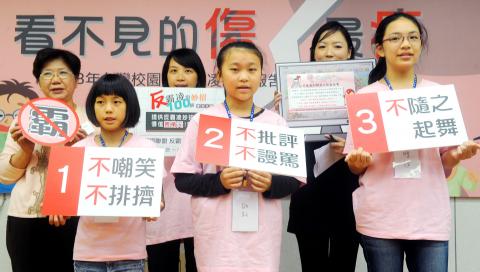The incidence of bullying at schools has significantly dropped from last year, the Children’s Welfare League Foundation said yesterday, adding that a large majority of victims suffer not only physical bullying, but also “relational aggression,” a type of bullying that is easily overlooked and hard to detect, but can result in lasting psychological trauma.
Bullying in schools has decreased since 2007 due to government efforts and rising public awareness, the foundation said.
However, anti-bullying initiatives still face several challenges, it said.

Photo: Wang Min-wei, Taipei Times
Teachers and parents often overlook relational aggression, with victims choosing to remain silent as they believe that speaking out about bullying will not help.
According to a survey conducted earlier this year, 16.3 percent of fourth, fifth and sixth graders were said to have experienced bullying at school.
Of those, 94.8 percent were victims of relational bully.
Children’s Welfare League Foundation research and development director Chiu Ching-hui (邱靖惠) said that relational bullying often involves the intentional social exclusion of a victim or spreading rumors to ruin the victim’s social networks, and can cause the victims to feel detached and depressed.
“However, according to another survey conducted online, 93.7 percent of parents and 88.7 percent of children polled take school bullying to be physical violence only, while 30 percent of them think that boys are more likely to become bullies. What’s more, 26 percent of children do not consider peer exclusion as a kind of school bullying,” Chiu said.
Relational bullying has also been aggravated by the Internet.
The survey shows that 62.4 percent of children consider cyberbullying more serious than real-life bullying, reflecting the fact that it is easier to victimize children in a world where real-life rules and adult oversight are lacking.
Many victims do not reveal the bullying to adults, for fear of revenge or being slighted as a “whistle-blower” or because they fear adults’ countermeasures.
Children’s distrust is actually disappointingly justified, the foundation said, as the survey found that 78 percent of reported cases were not resolved properly or even deteriorated.
As worrying as children’s distrust is parents’ distrust of teachers, Chiu said.
“Nearly half of the parents felt all channels of help were closed to them when they needed one, and more than half of them do not believe teachers can be trusted in solving the issue if their kids are bullied,” Chiu said.
While more government attention and action are necessary, the children’s foundation is also asking for children’s assistance in eradicating school bullying, encouraging them not to ridicule, exclude, slander or reinforce bullying, but to respect fellow students and take action against bullying.
Bullying is a group phenomenon, Chiu said, adding that “both the individuals involved in a bullying case and the class as a whole have to be educated.”

The manufacture of the remaining 28 M1A2T Abrams tanks Taiwan purchased from the US has recently been completed, and they are expected to be delivered within the next one to two months, a source said yesterday. The Ministry of National Defense is arranging cargo ships to transport the tanks to Taiwan as soon as possible, said the source, who is familiar with the matter. The estimated arrival time ranges from late this month to early next month, the source said. The 28 Abrams tanks make up the third and final batch of a total of 108 tanks, valued at about NT$40.5 billion

Travel agencies in Taiwan are working to secure alternative flights for travelers bound for New Zealand for the Lunar New Year holiday, as Air New Zealand workers are set to strike next week. The airline said that it has confirmed that the planned industrial action by its international wide-body cabin crew would go ahead on Thursday and Friday next week. While the Auckland-based carrier pledged to take reasonable measures to mitigate the impact of the workers’ strike, an Air New Zealand flight arriving at Taipei from Auckland on Thursday and another flight departing from Taipei for Auckland on Saturday would have to

A group from the Taiwanese Designers in Australia association yesterday represented Taiwan at the Midsumma Pride March in Melbourne. The march, held in the St. Kilda suburb, is the city’s largest LGBTQIA+ parade and the flagship event of the annual Midsumma Festival. It attracted more than 45,000 spectators who supported the 400 groups and 10,000 marchers that participated this year, the association said. Taiwanese Designers said they organized a team to march for Taiwan this year, joining politicians, government agencies, professionals and community organizations in showing support for LGBTQIA+ people and diverse communities. As the first country in Asia to legalize same-sex

MOTIVES QUESTIONED The PLA considers Xi’s policies toward Taiwan to be driven by personal considerations rather than military assessment, the Epoch Times reports Chinese President Xi Jinping’s (習近平) latest purge of the Chinese People’s Liberation Army (PLA) leadership might have been prompted by the military’s opposition to plans of invading Taiwan, the Epoch Times said. The Chinese military opposes waging war against Taiwan by a large consensus, putting it at odds with Xi’s vision, the Falun Gong-affiliated daily said in a report on Thursday, citing anonymous sources with insight into the PLA’s inner workings. The opposition is not the opinion of a few generals, but a widely shared view among the PLA cadre, the Epoch Times cited them as saying. “Chinese forces know full well that